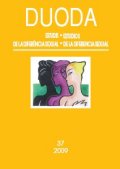¿Violencia post-patriarcal? El amor, la política y la necesaria reinvención de las relaciones entre hombres y mujeres
Article Sidebar

Main Article Content
Marco Deriu
The cultural and social revolution undertaken by feminism, the transformations of sexuality, the introduction of divorce and the demystification of the institution of marriage, the economic transformations and those of the
working world –with the growing importance of women’s work-, and more recently the crisis of the political and financial institutions, have contributed to making manifest the end of the patriarchal cultural model that was founded on male authority, hierarchy, the dominance of the paternal figure, the denial of women’s subjectivity and control over the feminine body. There is no aspect of our life that is not facing a change in relation to the arrival of feminine freedom in the relationship between the sexes. What does the arrival of feminine freedom and the free desire of women mean for men and what does it all mean in the reconstruction of a culture of relationships between the sexes? In a paradoxical way, today the freedom and subjectivity of women are precisely what place men in the greatest difficulties. Men today have to deal with what is
essentially a “double change” on the personal and social level. The rapid decay of the patriarchal hierarchical model does not transform itself in an automatic and lineal way into a gain in the area of manwoman relationships. In this transitional period, the risks of disorientation, confusion and resentment are strong, in a reconsideration of male violence towards women, above all in close relationships. The problem of male violence against women does not affect only areas or niches that are culturally backward. Neither can this violence be considered only to be a residue or death throe of patriarchal society. On the contrary, we can hypothesize that in this moment of transition we are witnessing a transformation of male violence in qualitative terms, evident in countries such as Italy which have registered a clear increase in feminicide in recent decades and more specifically of homicide in the domestic sphere, in a trend that is contrary to the decrease of other forms of social violence. We should look deeper into the idea of a specific male violence, that we could define as “post-patriarchal”, typical of a social and symbolic condition of greater formal equality as in that
reached in the so-called mature democracies. The existence of a postpatriarchal violence invites us to reread egalitarian representations in a more problematising way and to identify the nucleus of the present male crisis and the challenge of a transformation of the relationships with more attention.
working world –with the growing importance of women’s work-, and more recently the crisis of the political and financial institutions, have contributed to making manifest the end of the patriarchal cultural model that was founded on male authority, hierarchy, the dominance of the paternal figure, the denial of women’s subjectivity and control over the feminine body. There is no aspect of our life that is not facing a change in relation to the arrival of feminine freedom in the relationship between the sexes. What does the arrival of feminine freedom and the free desire of women mean for men and what does it all mean in the reconstruction of a culture of relationships between the sexes? In a paradoxical way, today the freedom and subjectivity of women are precisely what place men in the greatest difficulties. Men today have to deal with what is
essentially a “double change” on the personal and social level. The rapid decay of the patriarchal hierarchical model does not transform itself in an automatic and lineal way into a gain in the area of manwoman relationships. In this transitional period, the risks of disorientation, confusion and resentment are strong, in a reconsideration of male violence towards women, above all in close relationships. The problem of male violence against women does not affect only areas or niches that are culturally backward. Neither can this violence be considered only to be a residue or death throe of patriarchal society. On the contrary, we can hypothesize that in this moment of transition we are witnessing a transformation of male violence in qualitative terms, evident in countries such as Italy which have registered a clear increase in feminicide in recent decades and more specifically of homicide in the domestic sphere, in a trend that is contrary to the decrease of other forms of social violence. We should look deeper into the idea of a specific male violence, that we could define as “post-patriarchal”, typical of a social and symbolic condition of greater formal equality as in that
reached in the so-called mature democracies. The existence of a postpatriarchal violence invites us to reread egalitarian representations in a more problematising way and to identify the nucleus of the present male crisis and the challenge of a transformation of the relationships with more attention.
Article Details
Com citar
Deriu, Marco. «¿Violencia post-patriarcal? El amor, la política y la necesaria reinvención de las relaciones entre hombres y mujeres». DUODA: estudis de la diferència sexual, 2009, núm. 37, p. 113-31, https://raco.cat/index.php/DUODA/article/view/184023.
Drets
Drets d'autor
Els autors i les autores conserven els drets d’autoria i atorguen a Duoda el dret de primera publicació, a partir del qual l’obra serà disponible simultàniament sota una Llicència de Reconeixement-NoComercial-SenseObraDerivada (cc-by-nc-nd) que permet compartir l’obra amb tercers, sempre que aquests en reconeguin l’autoria i la publicació inicial en aquesta revista.
Articles més llegits del mateix autor/a
- Marco Deriu, Amor y reconocimiento: la violencia masculina y el sentido de nuestras relaciones , DUODA: estudis de la diferència sexual: 2007: Núm.: 32
- Marco Deriu, De hijo a padre y a hijo. Un itinerario reflexivo para crecer como padres , DUODA: estudis de la diferència sexual: 2014: Núm.: 46